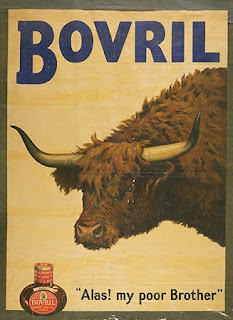 Having recently purchased five jars of Bovril, I was challenged to determine whether this might be enough of the beef-bouillon concentrate to reconstitute a whole cow. (This is all thanks to Elizabeth's excellent post comments the other day). It would have been a good idea, though, to have read the labels before purchasing the jars: I am now the proud owner of five utterly beefless containers of the stuff, part of the Bovril brand's dark years (2004-2006). The jars are also past their expiration dates of December 2007.
Having recently purchased five jars of Bovril, I was challenged to determine whether this might be enough of the beef-bouillon concentrate to reconstitute a whole cow. (This is all thanks to Elizabeth's excellent post comments the other day). It would have been a good idea, though, to have read the labels before purchasing the jars: I am now the proud owner of five utterly beefless containers of the stuff, part of the Bovril brand's dark years (2004-2006). The jars are also past their expiration dates of December 2007.To say that no cows were harmed in the production of these beefless Bovril jars would, however, be true only in the narrowest of senses. In the old days, OXO, Bovril's parent company, rode upon the broad shoulders of the British Beef Industry, whose scraps and bones formed nearly 40% of the unguent yeast extract's ingredient list. ("Alas! My poor brother," sighs a mournful steer as it contemplates an interwar-era bottle of the stuff). This all changed, if only briefly, during the height of the Mad Cow scare. For a two-year period between 2004 and 2006, Bovril's new parent company, Unilever, removed the beef in order to counter trade restrictions on British meat products.

This is the Bovril I ended up with. So it's beef-free. This doesn't mean, however, that no cows were harmed during its production. All it takes is to recall the massive cattle and sheep purges throughout agricultural Britain, and the notion of "beef-free" suddenly becomes a bit more harrowing. Alas indeed: my poor brothers and sisters.
The consequences of this purge chez nous is a bit more banal: an overstock of now-antiquated yeast extract. Needless to say, the experiment of reconstituting cows ended before it ever began. We have put away our alembics and specimen jars.
But am I unhappy? Am I disappointed? Not in the least.
Because the fact is that it tastes exactly the same. I can spread it on toast with impunity. Maybe I'll even boil up a mug of beef tea, to fortify myself after a bracing constitutional. And I can certainly pooh-pooh the fact that the jars are past their prime. The sell-by date on an imperishable product like Bovril, after all, is about as specious as a sell-by date on diet soda. One of the joys of the product is its relative infinitude: it's built for the larder.
My conclusion: Bovril does not even taste like beef, and it never did. If one were to describe the flavor, one might say that it tastes, well, brown. And salty. If cattle have anything to do with Bovril's flavor, then this is more a matter of distinguishing it from Marmite-- that other brown yeast extract-- than of reproducing the essence of cattle.

I'm not sure where this leaves us, except to marvel at the Bovril brand's remarkable hold on the British consciousness. And thus, in turn, on my own. Will Bovril restore your vigor? But of course. Will Bovril guide you through the lean years of your life? Naturally. Will Bovril cure your hangover? Why, yes. Yes it will. And will Bovril keep the British Empire running strong? We all know the answer to this:
If you keep it in a thermos, you can take it with you almost anywhere. And so, in a sense, yes.

1 comment:
So you're telling me that the cans of Heinz Baked Beans that have lurked in our larder for years, brought back from a visit to family in Scotland, are not actually rancid, despite being past their sell-by date?
You're telling me that I can eat beans on toast whenever I want?
I knew it was a good idea to keep those cans around. From souvenir to dinner in one blogpost.
Post a Comment